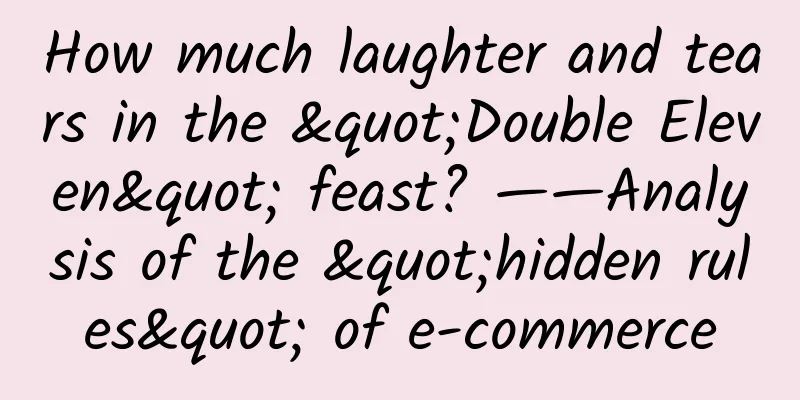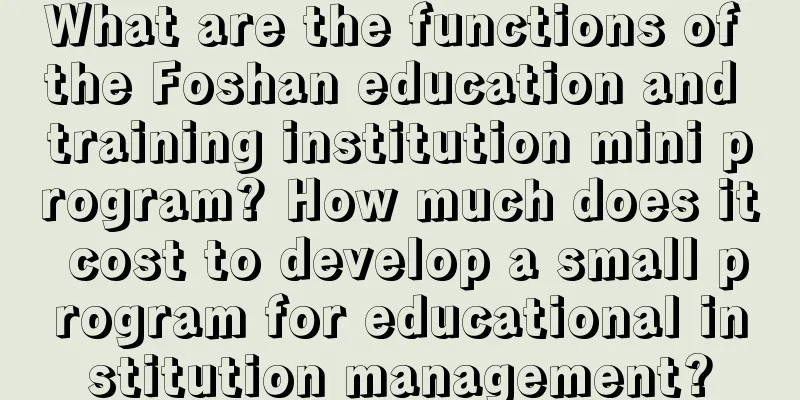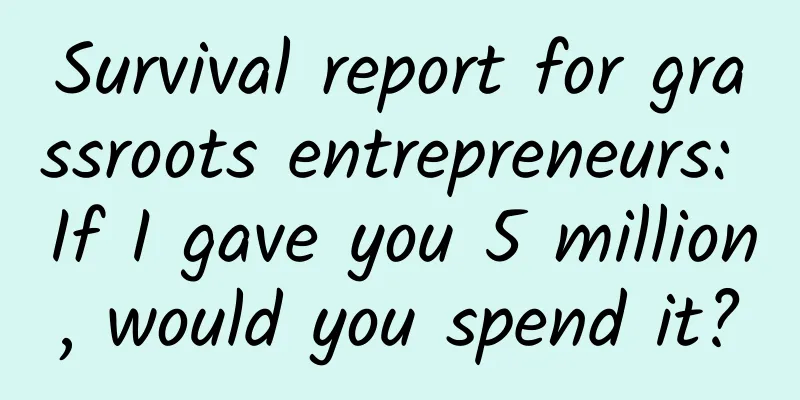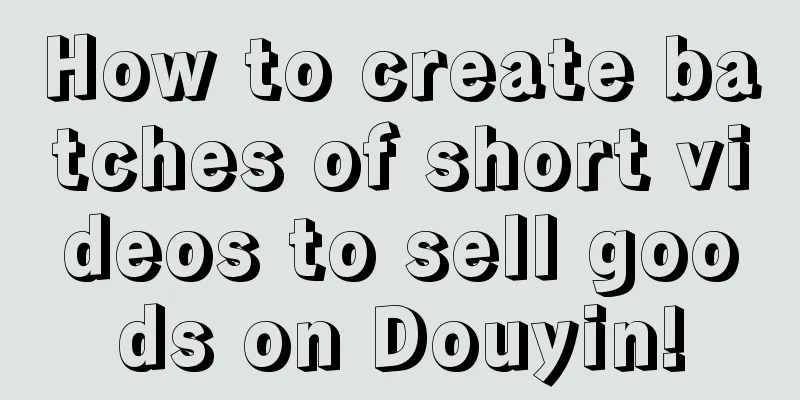How much laughter and tears in the "Double Eleven" feast? ——Analysis of the "hidden rules" of e-commerce

|
Xinhua News Agency, Beijing, November 10 (Reporters Guo Yujing, Wang Min, Wang Pan, Gao Bo) For merchants, is this a profit-making feast where they can "sharpen their knives"? For consumers, is this a carnival where they can buy "great value for money"? On the occasion of the eighth anniversary of the "Double Eleven" event, Xinhua News Agency reporters visited Beijing, Zhejiang, Guangdong and other places, and saw the booming online shopping and sales, but also learned that there are still serious problems such as fake orders and consumer fraud. In the context of platforms having an overwhelming advantage in the e-commerce industry, these phenomena and problems all point to the chronic disease that has been in urgent need of treatment for many years - the "hidden rules" of e-commerce. Huge promotion costs: enrich the platform, but make the merchants thin "I get nervous when 'Double Eleven' comes," said the head of an electrical appliance e-commerce company in Shunde, Guangdong. All promotions provided to consumers are paid for by brand owners. We can only say that we should be rational during 'Double Eleven' and hope that consumers will recognize the brand rather than buy products at low prices. E-commerce platforms have never released data on the health of merchants. Senior e-commerce professionals have found that many online merchants around them have worked hard for many years, but only have sales but no profits. Where did the profits go? The most important reason is the high cost. According to the reporter's investigation, the actual operating costs of many online stores are already higher than those of physical stores. Online e-commerce companies that do not have store rents and cut channel costs are now also bearing huge operating costs. The main reason for this is the vicious market environment caused by competitive rankings and the indulgence of fake orders. An executive of a large e-commerce platform said that promotion fees are the main source of income for the platform and also account for the main cost of small and medium-sized e-commerce companies. Promotion fees are generally similar to search engine bidding rankings, and are mainly paid according to clicks, transactions, and impressions. Merchants operating on e-commerce platforms bid according to their own needs and purchase advertising space according to traffic bidding. The platform displays the merchant's bids from high to low. Merchants do not know the bids of other merchants. If they find that the traffic of their own stores has dropped, they can only increase the bid again. He revealed that the disadvantage of this model is that as the number of merchants on the e-commerce platform increases, it becomes extremely difficult to obtain traffic. Especially when mobile terminals now account for 80% of transactions, it is even more difficult to display in the front of the few mobile pages. Cao Lei, director of the China E-commerce Research Center, said that the marketing costs of enterprises on e-commerce platforms have increased significantly. Although e-commerce platforms can bring a lot of traffic to merchants, after these traffic are distributed to a large number of merchants, each resource is very scarce, and merchants need to constantly purchase traffic to attract new customers. Han Du Yi She, which ranks at the top of Tmall's women's clothing sales, had operating income of 820 million yuan and 1.26 billion yuan in 2014 and 2015, respectively, but net profit was only -37.54 million yuan and 33.85 million yuan. The main investment in the promotion of traffic in 2014 and 2015 was as high as 94.92 million yuan and 130 million yuan respectively. According to Cao Lei's research on the e-commerce industry, online stores in each category can be divided into three echelons according to the pyramid structure: the first echelon is the top 1 to 10 merchants in the industry. Due to the advantages of big brands, their traffic cost accounts for about 10% to 20% of their income; the second category is the merchants ranked 10 to 100 in the industry, and the traffic cost accounts for about 20% to 40%; the third category is at the bottom of the pyramid, ranked after 100, and is also the largest group. They even have to rely on 40% of their income to attract traffic. How to maintain such a high traffic cost? In many cases, either huge losses are incurred after huge investments, or they can only rely on counterfeiting and fraud. "The top ten may not be able to make money, let alone the merchants who have no advantages at the back." He said. The reporter visited some businesses and found that the promotion cost of a Taobao store that has been established for about a year is between 500 and 1,000 yuan per day, and a large amount of investment in the transaction is given to the e-commerce platform.
When talking about his own costs, a senior Taobao shop owner who has been in business for more than 20 years and has been selling online for more than 10 years said that in the past few years, there were fewer online merchants and less competition, so the promotion costs were not too high. However, in recent years, he has to rely on spending money on promotion, and the promotion costs account for at least 10% of the average customer transaction. After deducting the costs of customer service salaries, store maintenance, returns and exchanges, the online operating costs are already very high. Fake orders and fake reviews: False prosperity hurts the foundation of integrity Mr. Huang, an online shop owner from Jiaxing, never expected that his idea of opening an online shop to open up online sales channels would cause him to lose five to six million yuan in more than a year. During the "Double Eleven" last year, Mr. Huang began to try to increase the credit rating of his store by faking orders. About 30% to 40% of his friends also engaged in fake transactions. He told reporters that if you don't do fake orders when others are doing it, you are just waiting to die. However, the high fees for fake orders are a way to kill small and medium-sized businesses. He calculated for reporters that each fake order must have real transaction fees and logistics costs. For example, for a suitcase priced at 200 yuan, the cost of fake orders is as high as dozens of yuan. The real commission of e-commerce transactions makes small and medium-sized businesses lose more and more. "In the beginning, the platform doesn't care whether you fake orders or not, as long as you can earn commissions." The commission he mentioned is the commission that the e-commerce platform takes from the merchants on their online transactions. His commission cost is about 5% of his income. The phenomenon of fake orders that is tolerated has become the fuse for the high commission. How serious is the problem of fake orders? Han Du Yishe E-commerce Group even wrote in its prospectus for listing on the New Third Board this year: As competition in the clothing e-commerce market becomes increasingly fierce, some e-commerce companies have engaged in vicious competitive behaviors such as "fake orders" and selling counterfeit and shoddy products, which have affected the market order. The high promotion costs of the platform make it difficult for merchants to bear the losses. The e-commerce platform condones fake orders, fraud, and tax evasion, which are serious harms, and even damages the interests of consumers and infringes on the interests of honest and law-abiding operators. This phenomenon of "bad money driving out good money" has caused many companies to withdraw from the e-commerce platform due to unbearable losses. This series of frauds, which seemed watertight, resulted in inflated online store transaction amounts, but in fact they were just virtual data running idle. Gan Lin, deputy director of the State Administration for Industry and Commerce, said recently that this year the Administration has deployed a special Internet governance action to address irregularities in Internet-based concentrated promotions and restrictive and excluding competition. For example, fake orders and fake reputations have impacted the Internet market system, showing characteristics of diversity and strong concealment. Some fakers circumvent backstage monitoring and provide direct services to increase sales by buying and selling by themselves. The reporter's investigation revealed that some unscrupulous merchants use "Double Eleven" as an opportunity to sell goods, passing inferior goods off as good ones, and fake goods off as genuine ones, taking the opportunity to sell infringing and counterfeit goods; "fake discounts" and "fake discounts" such as price increase first and then decrease, high markup and low discount, price without goods, fake lotteries, and inferior gifts are emerging in an endless stream; false advertising, failure to implement "seven-day no-reason return" and other illegal phenomena occur from time to time. “Price War”: The root cause of counterfeit and inferior goods on the Internet has not been eliminated Also criticized are counterfeit and shoddy products and price fraud. According to the results of the special random inspection of online trading goods recently announced by the State Administration for Industry and Commerce, the overall detection rate of substandard goods is as high as 34.6%. The goods sampled involved daily consumer goods such as home appliances, digital products, furniture, clothing, luggage, detergents, etc. A total of 503 batches of goods were sampled, of which 4 batches were "three-no" products and 2 batches were confirmed by the manufacturer as counterfeit goods. Among the 172 batches of substandard goods detected, about 93% were substandard in internal quality. A report from the industrial and commercial department showed that on "Double Eleven" in 2015, monitoring data showed that 52.99% of the promoted goods first increased and then decreased in price, and the proportion of hot-selling goods that first increased and then decreased was as high as 75.52%. Among them, the price of a few goods increased by more than 200%, and price fraud was serious. Internet expert Fang Xingdong said that from an industry perspective, the biggest problem of e-commerce's impact on the industry is that bad money drives out good money and inferior products squeeze out good products. In the e-commerce platform mechanism, low enough prices can reflect competitive advantages. Counterfeit and shoddy products reduce costs and naturally become competitive advantages. "If a company is defeated by other excellent companies, it has nothing to say, but it is always defeated by products that are worse than its own, squeezing out regular companies, so it is naturally unconvinced. For many years, the public's resentment against e-commerce platforms mainly comes from this." "Price wars are the most harmful to companies," said the above-mentioned Shunde e-commerce brand company, but the platforms have too much say and are becoming more and more monopolistic, and merchants are a vulnerable group, so there is nothing they can do. The reporter interviewed several Taobao merchants in Guangdong, Hebei and other places. Almost all of them said that due to the lack of standards for industry competition, product prices have been falling, homogeneity is serious, and low-price competition is fierce, so product prices have to be made cheaper and cheaper. A merchant selling outdoor bags gave an example, saying that there is a bag priced at 29 yuan, but some factories make it for 19.9 yuan and include shipping in order to compete, and they sell it at a loss. The lower the price, the lower the quality will be. The cost of auxiliary materials and labor will have to be reduced. Not only will the company's profits be low, but the product quality is also poor, the return rate is high, and the rate of negative reviews is also high, which is a vicious cycle. "But if you don't do this, you won't be able to sell it. If the price is too high, the promotion fee will have to be increased. How can you not feel bad when you see it?" she said. Wang Chunyu, who runs an e-commerce business in Baigou, Hebei, has also felt that it has become more difficult every year. He believes that due to the serious problem of fake orders, many consumers now have a certain resistance to e-commerce and no longer have the initial sense of novelty. These competitions have compressed the profit space. Mr. Huang, who suffered huge losses, also said: "If it was due to poor management, I would of course blame myself for my lack of ability, but I am not convinced that I lost to fake orders and counterfeit merchants." Since the development of "Double Eleven", sales have become more and more popular, and consumers are eager to shop. However, the reason is not mainly due to product innovation, quality improvement, brand strengthening or optimized consumer experience. Its essence is still the traditional price war dominated by low prices. In order to maintain user traffic and gain competitive advantages, merchants who are caught up in many factors have no choice but to cater to this low-price concentrated promotion business model, desperately squeezing normal profit margins or even "losing money to gain publicity", which in turn forces manufacturers to continuously reduce production costs and use low-quality and low-priced raw materials to produce cheaper products, which ultimately leads to sacrificing product quality and giving up upgrading and innovation to achieve low prices. Experts said that the excessive expansion of the "Double Eleven" model will gradually erode the innovation and quality foundation that the domestic manufacturing industry has painstakingly accumulated over the years in the process of industrial transformation and upgrading, and will ruthlessly bind a large number of private enterprises in the traditional vicious price war of low prices and low quality. Fang Xingdong said that some private enterprises and small and medium-sized enterprises with strong growth potential and competitiveness were not defeated by innovation, but by low-priced and low-quality products, so they have many complaints and are very dissatisfied. Similarly, the squeeze of e-commerce platforms on upstream and downstream has also begun to emerge. A courier company manager complained that the courier company prepared personnel, vehicles, and venues during the "Double Eleven" period to ensure that there would be no problems during the peak days of the annual business volume. However, when the business volume returned after "Double Eleven", the problem of overcapacity began to emerge, and the industry fell into an irresistible "blood and tears price war" under fierce competition. Not only do consumers often fail to receive goods for a long time, but the goods they just received are also returned to the courier because they are far from their expectations. Irrational overdraft consumption has repeatedly worn out consumers' patience. The above-mentioned person believes that although companies have become more and more experienced in preparing for "Double Eleven" in recent years, the model of relying on "human wave tactics" to fight has not changed. Eradicating "psoriasis": Platform expansion needs to be checked Eliminating multiple circulation links, improving operational efficiency, and reducing business costs - however, compared with the dividends brought by the rise of e-commerce, today's high traffic costs, poor market environment, widespread illegal advertising and other problems have not only not been eliminated, but are evolving into the direction of industry chronic diseases. What exactly is the reason why the e-commerce industry can never get rid of these "psoriasis" attached to itself? In the reporter's investigation, the platform overwhelmed brand companies and consumers, and was seen as the root cause of the problem, as it was "only one dominant player" in the e-commerce industry. From its initial development in 1999 to its rapid growth after 2009, the development of e-commerce in my country has gradually evolved from a situation of "letting a hundred flowers bloom" to a situation of "two strong competitors". "Tmall + Suning" and "JD.com + Tencent" have constituted the basic pattern of the "Double Eleven" e-commerce field in the past two years. Other merchants have taken sides, presenting a situation of "oligopoly" confrontation. For example, before the "Double Eleven" in 2015, it was revealed that JD.com had reported Alibaba Group to the State Administration for Industry and Commerce under its real name, accusing it of disrupting the order of the e-commerce market and forcing merchants to "choose one of two" in the "Double Eleven" promotion. A supervisor from the industrial and commercial department said that as an online trading platform with a dominant position in concentrated promotional activities, the mandatory setting of rules to restrict or directly exclude operators on the platform from independently carrying out promotional activities has hindered normal market competition and seriously damaged the legitimate rights and interests of merchants and consumers. Such monopolistic behavior and unfair competition behavior that abuses market dominance cannot be ignored in its damage to the order of the online market and the industry ecology, and will also have an adverse impact on the long-term stable development of the online economy. Such a monopoly situation has led to the expansion of e-commerce power. E-commerce companies with huge traffic-generating capabilities can often decide the life and death of merchants operating on their platforms simply by their power to attract investment, prioritize review orders, and select display locations. If there is a lack of external supervision mechanisms, rent-seeking space will inevitably arise. For example, Taobao's "shop assistants" were once exposed for accepting bribes, and JD.com also recently announced the illegal and irregular behaviors of its employees that were recently investigated and handed them over to judicial authorities for serious handling. "Any 'waiter' has much more influence on a company than the president of an industry association. There is a saying in the industry that a company has two most important overseas offices, the first is the 'Beijing Office' and the second is the 'Hangzhou Office'." In the view of some industry insiders, since fake orders and counterfeit sales will increase transaction volume, e-commerce platforms are the concentrated beneficiaries, so the platforms do not have enough motivation to solve the problem, especially in C2C platforms where this problem is most serious. The above-mentioned regulatory department personnel said that sometimes the platforms will publish some cases of cracking down on counterfeit goods and fake orders, but for them it only reduces their profits, and the platforms will never take the initiative to publish the full list and information of punishments. (Reporters involved in the interview: Zhang Xuan, Zhao Wenjun, Gao Kang, Yu Jiaxin, Gao Jing, Wei Hui, Ren Wei, Zhang Zhilong, Liu Shuo) ——————————————————————I am the cute dividing line————————————————————————————————
|
<<: The Double 11 battle is coming, don't worry, I'm not asking you to spend money
>>: [Comic] Programmers use Double 11 to get rid of 20 years of singles
Recommend
Best Practices for Agile Data Operations in Internet Finance—Wang Tong
Wang Tong , Vice President of Sales at Beijing Yo...
AARRR model case: How to use data to optimize channel delivery?
With the disappearance of the new population divi...
Shadow video live streaming
Introduction to the live streaming resources of S...
Website optimization SEO, website content page keyword optimization tips and methods!
A few days ago, a netizen asked me: How to write ...
Practice the art of Qiankun Da Neng Yi and handle app promotion, one person is enough! (Complete)
A few years ago, some friends in the circle recor...
How to do EDM marketing? Here is a complete guide to promotion
EDM marketing is now used by many product operati...
Case Analysis: How does Kugou increase its user base?
This is the fifth article I have written about gr...
2020 Teacher Gu's Modeling and Color Intermediate Class
2020 Teacher Gu's Modeling and Color Intermed...
Perfect Diary suffered a huge loss of 2.7 billion. Have you fallen into these misunderstandings about branding?
2020 is a period of key strategic investment for ...
In-depth analysis of Douyin e-commerce algorithm
Douyin e-commerce is like a game, and the algorit...
Liu Yiwei's "Corporate Commander" Baidu Cloud Download
Liu Yiwei's "Corporate Commander" R...
Loss of “WeChat” trademark: Why didn’t Tencent take it seriously?
[[129454]] "32/81, 39.5%". This is the ...
Summary of 2 aspects: The right way to open user growth
The essence of user growth is to conduct precise ...
5 things you must know about APP promotion, have you passed them?
Many students who do APP promotion spend their wh...
How to effectively use and manage negative reviews of APP
There is no need to explain the importance of APP...









